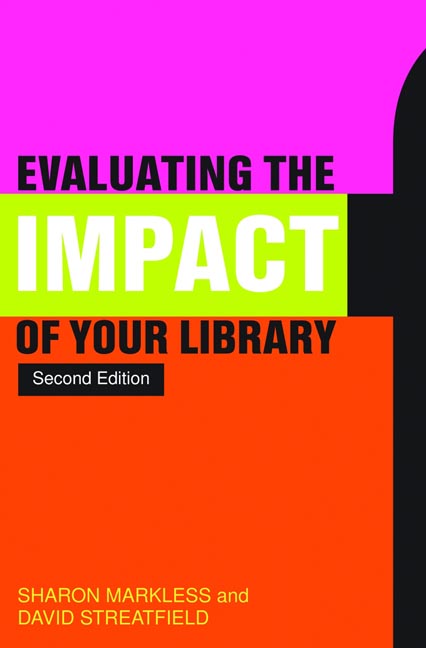Book contents
- Frontmatter
- Dedication
- Contents
- Introduction
- About the authors
- Impact and all that: use of some key terms in this book
- Part 1 The Context
- Part 2 Evaluating Impact
- Part 3 The Bigger Picture
- 11 Doing national or international evaluation
- 12 Where do we go from here?
- References
- Notes
- Index
- Evaluating and Measuring the Value, Use and Impact of Digital Collections
- Measuring Library Performance
- Miscellaneous Endmatter
11 - Doing national or international evaluation
from Part 3 - The Bigger Picture
Published online by Cambridge University Press: 08 June 2018
- Frontmatter
- Dedication
- Contents
- Introduction
- About the authors
- Impact and all that: use of some key terms in this book
- Part 1 The Context
- Part 2 Evaluating Impact
- Part 3 The Bigger Picture
- 11 Doing national or international evaluation
- 12 Where do we go from here?
- References
- Notes
- Index
- Evaluating and Measuring the Value, Use and Impact of Digital Collections
- Measuring Library Performance
- Miscellaneous Endmatter
Summary
This chapter is aimed at people who are interested in evaluating libraries at national or international level. The issues covered, including changes in thinking about international development impact evaluation and about ethical evaluation, and current developments in evaluation of public access computing, may also interest other readers.
Looking at the national and international picture
In this chapter we try to draw out some of the lessons that we have learnt from our impact evaluation work in various countries, and especially our international work for the Global Libraries Initiative (GL) and the International Federation of Library Associations (IFLA). We have tried to be cautious in generalizing too far because no two international projects are alike but some of the impact evaluation issues are likely to recur in some form in any large-scale projects.
(For more information about the Global Libraries Initiative see the note (1) to the introduction of this book. More information on the two IFLA work areas with which we have been involved, can be found in this note.)
Negotiate the terminology
Our international evaluation work has made one thing clear: the technical terms that we have suggested at the beginning of this book will not work across the board. We know from our involvement with impact specialists in different countries that some of the terms that we use, such as ‘impact’ and ‘advocacy’, do not readily translate into several East European languages (for instance Lithuanian or Romanian), at least if we wish to convey the same sense. Other terms, such as ‘assessment’, are used in particular and conflicting ways by different parts of the evaluation community (in UK education research, where assessment normally relates to student performance, versus US causation studies, where it denotes qualitative evaluation), and still others, such as the term for ‘evidence’ when referring to social science research evidence, has a different level of meaning in particular countries (such as Sweden – where it conveys the sense of legal proof). It is important to check out meanings of any potentially confusing evaluation words when working at international or national levels.
Respond to the national impact challenge
The world of library impact evaluation is changing, as politicians wrestle with the fall-out from the global economic crisis and every type of service is called into question.
- Type
- Chapter
- Information
- Evaluating the Impact of Your Library , pp. 183 - 206Publisher: FacetPrint publication year: 2012



